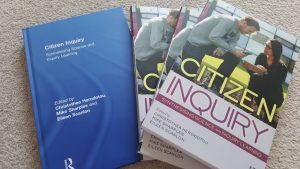
Christothea Herodotou, Mike Sharples and Eileen Scanlon, The Open University.
Citizen science or crowdsourcing has gained increasing popularity in recent years with web-based platform such as Zooniverse and iSpot scaffolding interactions between scientists and members of the public.
Little emphasis has been given to the educational benefits of citizen science, in particular for volunteers or members of the public who wish to contribute to citizen science activities.
Citizen inquiry: Synthesizing science and inquiry learning, recently published by Routledge, is the first edited collection of its kind to draw the emphasis on inquiry-based learning from participation in citizen science activities.
This innovative edited volume, by Christothea Herodotou, Mike Sharples and Eileen Scanlon, introduces the concept of ‘citizen inquiry’ to emphasize the active engagement of members of the public in citizen science activities.
By citizen science activities we refer to, not only participation in collecting or analysing data, but also the initiation, implementation, and completion of personally meaningful scientific projects.
Citizen science projects enacted by members of the public can be supported by mass participation, professional scientists, and online and mobile tools. Also, citizen inquiry expands across diverse disciplines; citizen science projects have been originally focused on natural and physical sciences.
Citizen inquiry suggests that mass participation in scientific activities could span diverse disciplines including education, psychology, sociology and medicine.
The book presents empirical evidence about how learning can be achieved or facilitated in a range of citizen science projects taking place in both formal and informal learning contexts.
The examples act as case-studies showcasing how citizen inquiry, as a new approach to learning, can contribute to scientific thinking, collaboration and life-long learning. Further, the examples demonstrate how citizen science and inquiry learning, when merged together, can lead to certain pedagogical advantages, such as the identification of sound solutions to real-life problems.
The introduction of the book is open and free to access. Select Citizen inquiry: Synthesizing science and inquiry learning to find out more.
Reference
Herodotou, C., Sharples, M. and Scanlon, E. (eds.) (2017). Citizen Inquiry: Synthesising Science and Inquiry Learning. Abingdon: Routledge. For further details, see: http://oro.open.ac.uk/51076.
